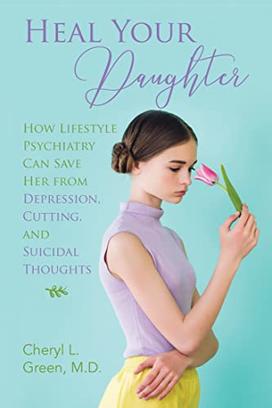Psychiatrist Cheryl L. Green *90 Advises Parents of Teenage Daughters in New Book
The Book: Heal Your Daughter (BookBaby) is a guide for parents with advice on how they can assist their daughters through the emotion-churning teenage years. Reinforcing positive exercises, lifestyle habits, and foundations, Green provides many key strategies for parents to help manage the physical and mental health of their daughters. Covering a wide variety of topics stretching from nutrition to stress reduction, this book is ultimately meant to empower families through a new branch of psychiatry, Lifestyle Psychiatry, to hopefully heal teens from depression, suicide, and other related problems.

The Author: Cheryl L. Green *90 is a psychiatrist from Southern California. In addition to writing, Green is also a part-time employee at the Loma Linda University School of Medicine and has her own private practice outside of Los Angeles. Green earned her bachelor’s degree from Harvard University, Ph.D. from Princeton University, and medical degree from Stanford University School of Medicine.
Excerpt:
Chapter 5 - Emotional Well Being
This chapter is the real meat and potatoes, so to speak, of this book. This domain of lifestyle, called emotional and social connectedness, or well-being, is an expansive one. It encompasses the whole of psychology, the whole of psychiatry, and also, lifestyle choices having to do with connectedness, which I characterize further as: connectedness with oneself, with others, and with something greater than oneself.
Lifestyle Psychiatry additionally emphasizes the use of motivational interviewing to encourage behavioral change, and often positive psychology, as well, to facilitate the creation of positive life goals to further inspire change.
In psychology- and psychiatry-as-usual, what the practitioner does is give the patient a diagnosis, then engage her in a specific type of therapy, and/or start her on a medication to address the symptoms that she and you, her parent, are able to verbalize.
What a lifestyle specialist would do is a little different. He or she will often diagnose a lifestyle to be worked on and remedied. This is because, often, the daughter or parent has no idea that these lifestyle habits might be impacting the way she feels. The lifestyle specialist may also diagnose the patient with something, but he or she will look to the lifestyle for the root causes of distress, rather than assuming faulty genetics or defects in brain chemistry, and he or she will expect your daughter’s diagnosis largely to resolve once those lifestyle-based root causes have been transformed. The lifestyle specialist will work with the patient as any other therapist would, but he or she will likely rely heavily upon motivational interviewing and/ or positive psychology to effect behavioral change.
Depressed patients, especially depressed kids, often need help from someone at home to initiate the changes that are needed. If you the parent or caregiver are able to work with her on a daily basis, you could be the most important factor in her healing.
Connectedness
First, a word about connectedness itself. What does it mean? There are several concepts used in psychology and psychiatry that have very similar meanings. One is “attachment.” Another is “bonding.” Another is “belonging.” Another is “connectedness.” Another is “self-esteem.” These are all, essentially, forms of love or self-love. The term “love” is not used, though, because that term lacks scientific rigor, and because it has been associated with so many false concepts, so much emotional baggage. Tragic overtones. Romantic or sexual connotations. Most music from the 1800s on, whether classical, folk, country, or pop, conditions us to believe that love is necessarily tragic, painful, agonizing, damaging, cruel, and overall bad – that love hurts, or even “stinks,” as one 1980s song goes. Similarly, in mythology and much literature, love is Cupid, the “blind assassin.” These are the concepts that your daughter may have been programmed by now to believe in.
But love actually isn’t all pain and suffering; it isn’t necessarily self-pampering or self-indulgence; it isn’t arrogance; and it doesn’t have to be a feeling on her part that she is any better than other people.
Carefully dodging all of those, the meaning we will ascribe to “love” in this chapter is more like what you feel for your close family members, or for your closest friends. An attachment or bonding. A deep concern. A wishing well for. A sense of connection. And more than feeling, it is also a doing of things that will cause the other person to survive and thrive. In the discussions below, we will use the terms “attachment,” “bonding,” “connectedness,” “relationship,” and “love” almost interchangeably.
However this supernal quality of connectedness is formulated, many people consider it to be the very thing that gives life its meaning. In the discussions below, I discuss three essential aspects of connectedness: her connectedness with herself, with others, and with something even greater
Part One: Connecting with Herself
To connect with, or love, herself, she really needs to start to know herself. She has a need for self-literacy, which involves, among other things, starting to become familiar with: 1) her own life history, 2) her own emotions, 3) her own needs, 4) the various components of herself, and 5) her dreams for the future. It’s worth sitting down with her and exploring these individual pieces. Then, knowing herself a little better, she can begin to reach out and connect with appropriate others. But first, let’s explore with her each of the aspects of self-literacy just mentioned. Each of the topics below could occupy quite a bit of time. Perhaps you and she can play “20 questions” after dinner each night, until, perhaps with your help, she has been able to flesh out some of these. And hopefully, you will keep track of what she says, and will help her to build some useful insights and skills based on those.
Her Life History Thus Far
My patients find it very helpful to develop an awareness of key aspects of their life histories. Perhaps you can help your daughter to develop an awareness of hers. You can talk with her about it, then even write it down for her. A basic life history or timeline could be, for example: “I was born in rural Ohio to my parents who were . . . then my little sister was born . . . then I started in public school and made a best friend So-and-So . . . then my parents divorced (or married, etc.) . . . after that I never saw my dad again . . . then my mom and sister and grandmother and I moved from the city to the country . . . I made a new friend So-and-So . . . then I got bullied in school for two years . . . then I started piano lessons and got really good and decided that I wanted to become a professional musician . . . then my grandmother died . . . and I haven’t really wanted to get out of bed since then.”
If you help her to write down her basic story thus far, perhaps you can also help her to write down some of the feelings she expresses as she talks about her life events – in this case, perhaps enthusiasm, love, loss, abandonment, victimization, pride, grief, or whatever other feelings she conveys as she speaks. Those will be the feelings that she can work on in the exploratory way described below, first the positive feelings, and then the negative ones.
Excerpted from Heal Your Daughter by Cheryl L. Green. Copyright 2023. Published with permission of the author.
Reviews:
“This refreshing and exciting book provides not just tools, but a foundation on which to build our children’s mental health.” — Dr. Grace Matheson, clinical assistant professor of psychiatry, Dayton Children’s Hospital, Wright State University School of Medicine
“Dr. Green brings an interesting perspective on an important topic affecting our daughters. An essential guide to supporting our girls with key lifestyle practices.” — Dr. Andrew Reza Khavari, clinical assistant professor of psychiatry, Dayton Children’s Hospital, Wright State University School of Medicine










No responses yet